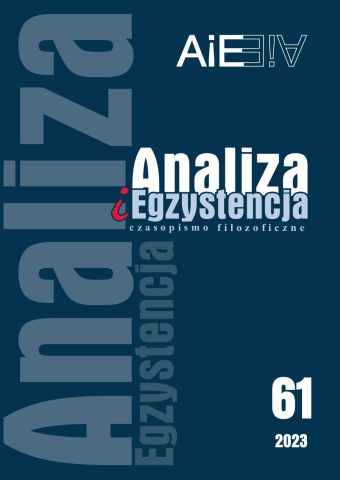
ISSN: 1734-9923
eISSN: 2300-7621
OAI
DOI: 10.18276/aie.2023.61-06





Issue archive /
61 (2023)
Fantazmaty „Polaka” czyli przemyślenia z obszarów egzystencjalnej filozofii religii
(Phantasms of a "Pole" or reflections from the area of existential philosophy of religion)
| Authors: |
Mirosław
Pawliszyn

Uniwersytet Warmińsko-Mazurski w Olsztynie |
| Keywords: | phantasm church system love church lie philosophy of religion |
| Data publikacji całości: | 2023 |
| Page range: | 25 (113-137) |
Abstract
The immediate inspiration for this text is Tomasz Polak's book "System kościelny czyli przewagi pana K" (The Church System or the Advantages of Mr. K). The author analyses in detail how the "system" works, claiming that it has taken over the church from the very beginning of its existence, absorbing the original vitality of the community. The conclusion he reaches is that the "system" is unreformable. In this article I compare T. Polak's basic thought with what Tomasz Węcławski wrote years ago about the church. I emphasize that this is the same person who changed his name due to life circumstances. I try to analyze how far the thinking, the way of argumentation, and finally the formulated conclusions have changed.
The key word for these considerations is "phantasm." In this light, the question of God "with me, in me, and over me" dies in the face of the workings of the "church system." The phantasm prevails over man and his living relationship to God. "The Church System or the Advantages of Mr. K", is a very sad story about an individual, even though told in an expert and difficult language. Religion, faith, which someone makes the determinant and meaning of life, is something that from the beginning is doomed to drift towards an unshakeable phantasm, something that, in fact, will never come true, except in the most intimate and private dimension.
Download file
Article file
Bibliography
| 1. | Bieńkowski S., (1946), Człowiek społeczny, Kraków, Powściągliwość i Praca. |
| 2. | Bierdiajew M., (2004), Zarys metafizyki eschatologicznej, przeł. W. i R. Paradowscy, Wydawnictwo Antyk, Kęty. |
| 3. | Chenu M. D., (1971), Homilia, przeł. I. S. Szalay, w: Concilium Materiały Kongresu „Przyszłość Kościoła”, Bruksela 12-17 września 1970, Pallottinum, s. 38-40. |
| 4. | Greeley A., (1971), Kierownictwo w kościele przyszłości, przeł. J. Kuligowska, w: Concillium. Materiały Kongresu „Przyszłość Kościoła”, Bruksela 12-17 września 1970, Pallottinum. s. 65-72. |
| 5. | Hamilton J., (2022), Definition of Obedience in Psychology, pobrane z: https://study.com/learn/lesson/obedience-authority-psychology-study-examples-stanley-milgrams-experiment.html (23.06.2022). |
| 6. | Heschel A. J., (2014), Prorocy, przeł. A. Gorzkowski, Wydawnictwo Esprit, Kraków. |
| 7. | Kołakowski L., (1991), Czy człowiek historyczny odszedł z tego świata i czy powinniśmy jego zgon opłakiwać?, w: Puls 48 (1991), s. 85-96. |
| 8. | Kung H., (1971) Co to jest chrześcijańskie posłannictwo, przeł. A. Mroczkiewicz, w: Concilium, Materiały Kongresu „Przyszłość Kościoła”, Bruksela 12-17 września 1970, Pallottinum, s. 59-64. |
| 9. | Polak T., (2020), System kościelny czyli przewagi pana K., Wydawnictwo NSiH, Poznań. |
| 10. | Rosenzweig F., (1998), Gwiazda zbawienia, przeł. T. Gadacz, Wydawnictwo Znak, Kraków. |
| 11. | Węcławski T., (2007), Deklaracja, pobrane z: https://www.tygodnikpowszechny.pl/deklaracja-139440 (23.06.2022). |
| 12. | Węcławski T., (2002), Gdzie jest Bóg? Małe wprowadzenie do teologii dla tych, którzy nie boją się myśleć, Wydawnictwo Naukowe Uniwersytetu im. Adama Mickiewicza w Poznaniu, Poznań. |
| 13. | Węcławski T., (1995), W teologii chodzi o Ciebie, Wydawnictwo Znak. Kraków. |
| 14. | Węcławski T., (2008), Zanikająca opowieść, pobrane z: https://www.tygodnikpowszechny.pl/zanikajaca-opowiesc-133147 (23.06.2022). |